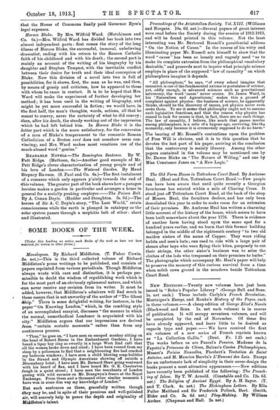Proceedings of the Aristotelian Society. Vol. XIIL and Norgate. 10s.
6d. net.)—Several papers of great interest were read before the Society during the session of 1912-1913, and will be found printed in this volume. Not the least interesting was Mr. Bertrand Russell's presidential address "On the Notion of Cause." In the course of his witty and illuminating paper Mr. Russell sets himself to show that the word "cause" has been so loosely and vaguely used "as to make its complete extrusion from the philosophical vocabulary desirable," and proceeds next to inquire what principle science employs in place of the supposed "law of causality" on which philosophers imagine it depends.
"All philosophers," he says, "of every school imagine that causation is one of the fundamental axioms or postulates of science, yet, oddly enough, in advanced sciences such as gravitational astronomy, the word 'cause' never occurs. Dr. James Ward, in his 'Naturalism and Agnosticism,' makes this a ground of complaint against physics: the business of science, he apparently thinks, should be the discovery of causes, yet physics never even seeks them. To me it seems that philosophy ought not to assume such legislative functions, and that the reason why physics has ceased to look for causes is that, in fact, there are no such things. The law of causality, I believe, like much that passes muster among philosophers, is a relic of a bygone age, surviving, like the monarchy, only because it is erroneously supposed to do no harm."
The bearing of Mr. Russell's contentions upon the problem of Free Will is obvious, and it is to this question that he devotes the last part of his paper, arriving at the conclusion that the controversy is mainly illusory. Among the other papers contained in the volume may be mentioned one by Dr. Dawes Hicks on "The Nature of Willing," and one by Miss Constance Jones on "A New Logic."














































 Previous page
Previous page